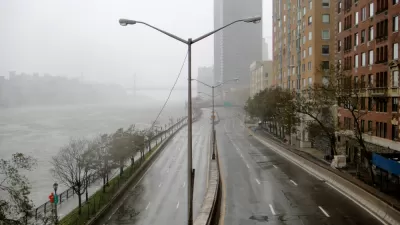Alexei Barrionuevo looks at how New York's real estate market has been impacted by the severe blackouts and flood damage from Hurricane Sandy. How long will the market for certain areas continue to feel Sandy's effects?
The last time lower Manhattan faced adversity was post-9/11, but the area recovered due to incentives to create new housing. "But the question now facing downtown New York is whether the hurricane stigma is just a short-term phenomenon, or will persist into the long term as well," says Barrionuevo. "Insurance costs are sure to rise, and lenders could become tougher on the area, mortgage brokers say, putting a damper on one of the great real estate stories in the country over the past decade."
A slew of deals to buy apartments in or near lower Manhattan have fallen through because potential buyers "thought that all of New York had succumbed to devastation," said broker Ryan Serhant, or "because of the storm they are not interested in this area anymore," said broker Frederik Eklund. A bigger issue, said Melissa L. Cohn, yet another broker, is that people who still want to buy buildings damaged by flooding cannot close deals until repairs are made, but "[n]o bank will finance in a building that has had storm damage."
"Lower Manhattan has had momentum lately, especially at the higher end of the market, where developers have been trying to cash in on the proliferation of superwealthy buyers flocking to New York," says Barrionuevo. "To compete with uptown, downtown developers have been fashioning megamansions and megapenthouses with large outdoor spaces and rooftop pools." These newer buildings have taken longer than older ones to be restored, and residents have been told that they will not be able to move back in for at least a few more months. Real estate brokers are concerned that the momentum has slowed down in Sandy's aftermath and that prices may be recalibrated to a lower level.
"Everyone, it seems, is sweating the potential for higher costs," concludes Barrionuevo. However, housing inventory in Lower Manhattan has generally been low, and while it may take time for the storm stigma to wear off, "it's hard to deny the appeal of waterfront property, especially in a city like New York." Cohn agrees, "People will come back downtown. If the property is priced properly, then they will be there."
FULL STORY: Downtown, the Crystal Ball Clouds Up

Maui's Vacation Rental Debate Turns Ugly
Verbal attacks, misinformation campaigns and fistfights plague a high-stakes debate to convert thousands of vacation rentals into long-term housing.

Planetizen Federal Action Tracker
A weekly monitor of how Trump’s orders and actions are impacting planners and planning in America.

Chicago’s Ghost Rails
Just beneath the surface of the modern city lie the remnants of its expansive early 20th-century streetcar system.

Bend, Oregon Zoning Reforms Prioritize Small-Scale Housing
The city altered its zoning code to allow multi-family housing and eliminated parking mandates citywide.

Amtrak Cutting Jobs, Funding to High-Speed Rail
The agency plans to cut 10 percent of its workforce and has confirmed it will not fund new high-speed rail projects.

LA Denies Basic Services to Unhoused Residents
The city has repeatedly failed to respond to requests for trash pickup at encampment sites, and eliminated a program that provided mobile showers and toilets.
Urban Design for Planners 1: Software Tools
This six-course series explores essential urban design concepts using open source software and equips planners with the tools they need to participate fully in the urban design process.
Planning for Universal Design
Learn the tools for implementing Universal Design in planning regulations.
planning NEXT
Appalachian Highlands Housing Partners
Mpact (founded as Rail~Volution)
City of Camden Redevelopment Agency
City of Astoria
City of Portland
City of Laramie




























